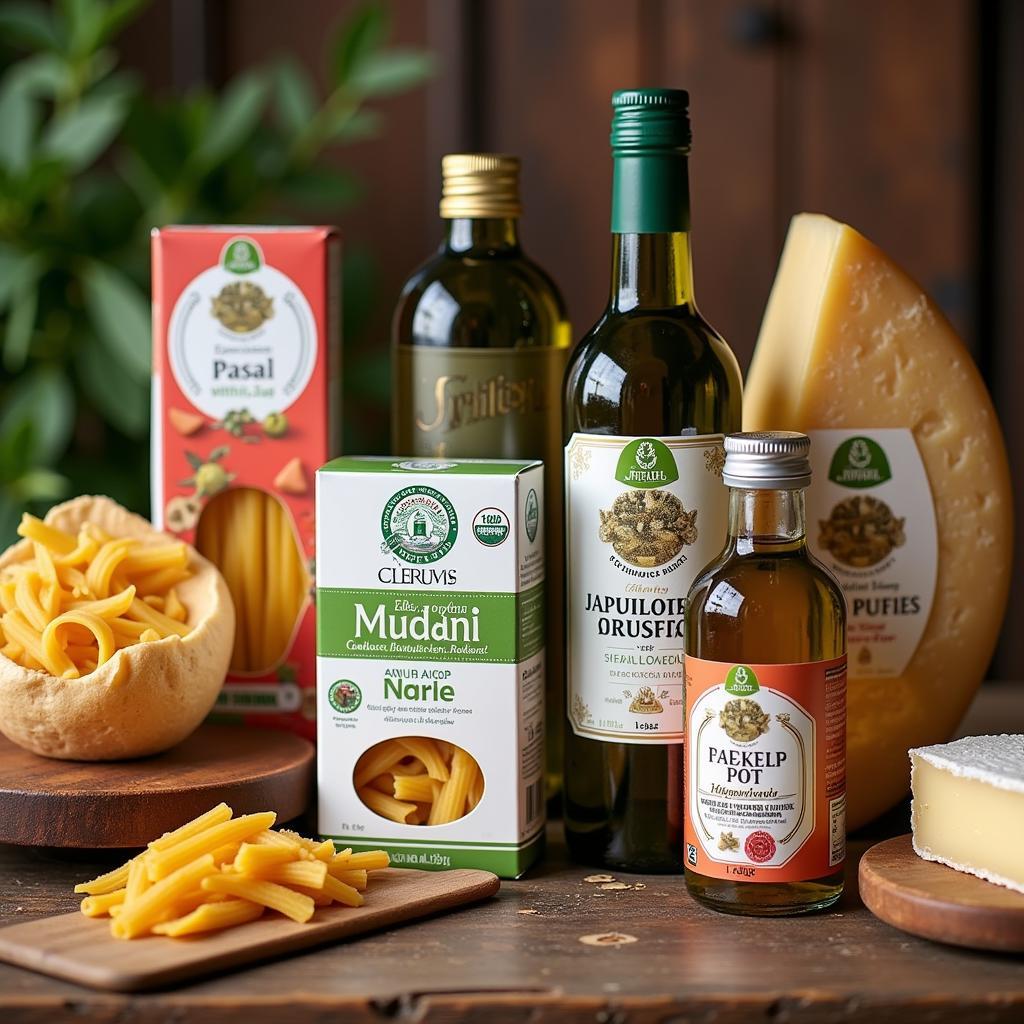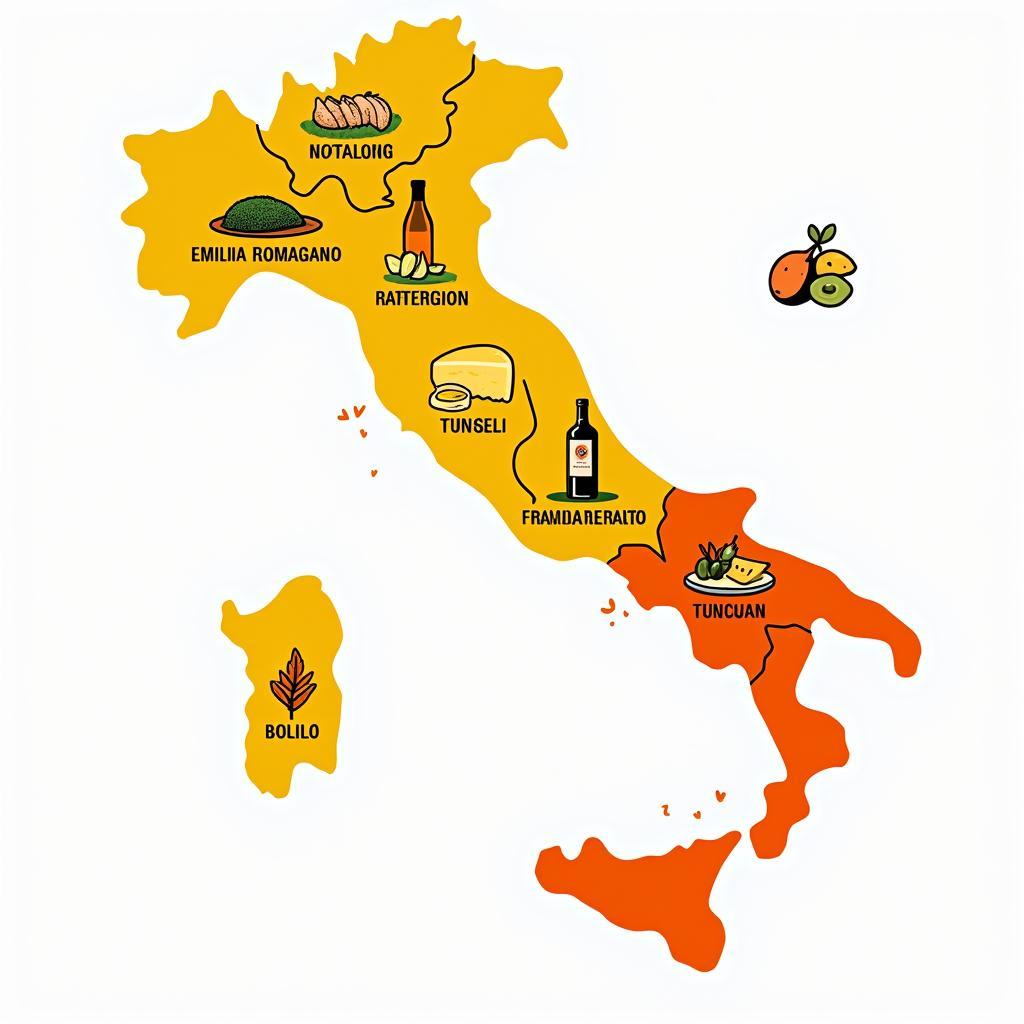Navigating the world of Italian food can be a delightful but sometimes overwhelming experience. With a plethora of products claiming Italian origins, how can you be sure you’re getting the real deal? This is where Italian Food Certification comes in, acting as your guide to authenticity and quality. From the rolling hills of Tuscany to the sunny shores of Sicily, Italy’s culinary heritage is renowned worldwide. But with this fame comes the inevitable: imitations.
Understanding Italian Food Certification
Italian food certifications are official designations awarded to products that adhere to strict guidelines regarding origin, production methods, and ingredients. These certifications are not just fancy labels; they are your guarantee that you are purchasing a product that truly embodies the essence of Italian gastronomy.
Why Italian Food Certification Matters
Choosing certified Italian food products offers a multitude of benefits:
- Authenticity: Certification guarantees that the product originates from a specific region in Italy and is made using traditional methods.
- Quality: Strict regulations ensure that only the finest ingredients and production techniques are used, resulting in superior flavor and quality.
- Cultural Preservation: Supporting certified products helps preserve traditional Italian culinary knowledge and craftsmanship for generations to come.
- Ethical Consumption: Certification often involves sustainable and ethical farming practices, supporting local communities and the environment.
The Main Players: DOP, IGP, and STG
The Italian government has established a three-tier system for food and wine certification:
- DOP (Denominazione di Origine Protetta): The highest level of certification, DOP products must be produced, processed, and packaged in a specific geographical area using traditional methods and local ingredients.
- IGP (Indicazione Geografica Protetta): IGP certification signifies that at least one stage of production, processing, or preparation takes place in a specific region, contributing to the product’s characteristics.
- STG (Specialità Tradizionale Garantita): STG certification highlights traditional recipes and production methods, even if the ingredients are not exclusively from a specific region.
 Italian Food Products Displaying DOP and IGP Labels
Italian Food Products Displaying DOP and IGP Labels
Deciphering the Labels: What to Look For
When shopping for certified Italian products, look for the following:
- The Certification Logo: Each certification (DOP, IGP, STG) has a unique logo displayed prominently on the packaging.
- Product Name: The product name should be accompanied by the specific DOP, IGP, or STG designation.
- The EU Symbol: Certified Italian products also carry the European Union’s quality scheme symbol, further guaranteeing authenticity.
Is Italian Food Online Store Legit?
With the rise of online shopping, it’s natural to wonder about the authenticity of Italian products sold online. While many reputable online retailers specialize in certified Italian goods, it’s essential to be discerning. Look for secure websites, read customer reviews, and verify contact information before making a purchase. For a reliable source of Italian culinary delights, explore the diverse selection available at is italian food online store legit.
Exploring Certified Italian Food: A Culinary Journey
From the creamy richness of Parmigiano Reggiano cheese to the delicate flavor of Prosciutto di Parma, the world of certified Italian food products is vast and enticing.
A Taste of Tradition: Regional Specialties
Each region in Italy boasts unique culinary traditions and certified products. For example:
- Campania: Famous for its buffalo mozzarella (Mozzarella di Bufala Campana DOP) and San Marzano tomatoes (Pomodoro San Marzano dell’Agro Sarnese-Nocerino DOP).
- Emilia Romagna: Home to Parmigiano Reggiano cheese (Parmigiano-Reggiano DOP), balsamic vinegar of Modena (Aceto Balsamico Tradizionale di Modena DOP), and Prosciutto di Parma (Prosciutto di Parma DOP).
- Tuscany: Known for its extra virgin olive oil (Olio Extra Vergine di Oliva Toscano IGP), Chianti wine (Chianti Classico DOP), and Pecorino Toscano cheese (Pecorino Toscano DOP).
 Map of Italy with Highlighted Regions Renowned for Certified Food Products
Map of Italy with Highlighted Regions Renowned for Certified Food Products
Beyond the Label: Appreciating the Value
Understanding and seeking out Italian food certification empowers you to make informed choices that support authenticity, quality, and cultural heritage. It’s about appreciating the dedication of Italian producers who strive to maintain the integrity of their culinary traditions.
“Authentic Italian food is more than just a meal; it’s a celebration of history, culture, and passion,” says Lorenzo Moretti, a renowned Italian chef and culinary historian. “Certification ensures that these traditions are honored and that consumers experience the true taste of Italy.”
Finding Kosher Food in Naples
Even when exploring specific dietary needs, like keeping kosher, Italian food certification can be a valuable guide. While not directly related to kosher practices, DOP, IGP, and STG labels can help you identify traditional products and producers. This can be a starting point for researching and finding authentic kosher options within a specific region. For instance, when searching for kosher food in Naples, these certifications can aid in identifying traditional producers who might offer kosher alternatives or be knowledgeable about local kosher establishments.
Italian Food Certification: A Legacy of Excellence
Italian food certification is a testament to the unwavering commitment to quality and authenticity that defines Italian cuisine. By choosing certified products, you are not just indulging in delicious food but also becoming part of a story – a story of tradition, passion, and culinary excellence passed down through generations.
Frequently Asked Questions About Italian Food Certification
1. What is the difference between DOP and IGP?
DOP (Denominazione di Origine Protetta) signifies that the product is entirely produced, processed, and packaged in a specific region using traditional methods. IGP (Indicazione Geografica Protetta) indicates that at least one stage of production is linked to a particular geographical area.
2. Are all Italian food products certified?
No, not all Italian food products carry certifications. However, certification guarantees authenticity, quality, and adherence to traditional methods.
3. Where can I find certified Italian food products?
Look for the DOP, IGP, and STG logos at specialty food stores, Italian delis, supermarkets with dedicated international sections, and reputable online retailers.
4. What is the purpose of Italian food certification?
Italian food certification aims to protect traditional culinary heritage, guarantee product quality, and provide consumers with authentic Italian products.
5. How can I learn more about specific certified Italian products?
Numerous online resources, culinary guides, and the official websites of the Italian Ministry of Agricultural, Food and Forestry Policies provide in-depth information about certified products and their origins.
Need Help Crafting Your Own Culinary Story?
Whether you’re a seasoned foodie or just starting your culinary journey, Mina Cones Food is here to guide you. If you need inspiration for using certified Italian products in your kitchen or have questions about building a food and beverage resume sample, our team is just a call away. Contact us at 02437655121, email us at [email protected], or visit us at 3PGH+8R9, ĐT70A, thôn Trung, Bắc Từ Liêm, Hà Nội, Việt Nam. We are available 24/7 to assist you with all your culinary endeavors.